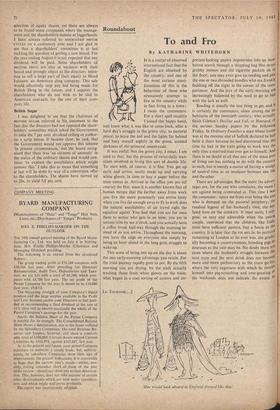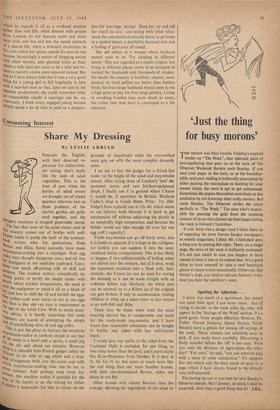Roundabout
To and Fro
By KATHARINE WHITEHORN
It was awful. Not the grimy city, I mean. I am used to that; but the process of twice-daily tran- sition involved in living this sort of double life. To start with, of course, it is fine. You get up early and arrive, neatly made up and carrying white gloves, in time to buy a paper before the train comes in. Arrived in the office you are (of course) the first, since it is another known fact of human nature that the farther away from work you live the more punctually you arrive (only when you live far enough away to fly to work does the natural unreliability of air travel right the equation again). You find that you are for once there to notice who gets in on time; you are in serious trim by ten o'clock, and you actually have a coffee break half-way through the morning in- stead of as you arrive. Throughout the morning, you have the edge on everyone else simply by being an hour ahead in the long grim struggle to wake up.
This sense of being one up on the day is about the one early-morning advantage you retain. For the train journey rapidly goes to pot. By the fifth morning you are drying, by the sixth actually washing those fresh white gloves on the train; what began as a cool sorting of austere and im- portant-looking papers degenerates into an inco' herent search through a shopping bag that drops grubby memos and old cigarette packets on to the floor; you may even give up reading and join the one or two shrouded bundles who are franklY finishing off the night in the corner of the com- partment. And the joys of the early morning are increasingly balanced by the need to go to bed with the lark as well.
Reading is usually the last thing to go; and it is certainly the commuters, alone among the in' habitants of the twentieth century, who actuallY finish Gibbon's Decline and Fall, or Hansard, of the serious Sunday papers by the following Friday. In Ordinary Families a man whose house was at the remoter end of Suffolk declared he had built it there because he had discovered that the time he had in the train going to work was the only time a married man ever got to himself. And there is no doubt at all that one of the main jnYs of living out has nothing to do with the country as such, but is merely a matter of having a wage of neutral time as an insulator between one life and the other.
There are advantages. But the more the advall' tages are, for the one who commutes, the more I am against being commuted at. This time I was the commuter : 'spare me from ever being the one' who is dumped on the pastoral periphery, the residual legatee of her husband's time, the is°' lated item on the outskirts. It must seem, I suP' pose, so easy and admirable when the yoUng couple, convinced that the children, like foal1. must have sufficient pasture, buy a house in the country. It is later that the rot sets in, he perforce remaining as London as he ever was, she grad°' ally becoming a countrywoman, breeding pigs or neuroses as the case may be. No doubt there are cases where the husband's struggle between the next train and the next drink does not becoule more and more perfunctory as the years go hY' where the very eagerness with which he throws himself into pig-scratching and rose-growing at the weekends does not indicate the extent te
'One would look absurd-in England dressed like this.'
Which he regards it all as a weekend pastime rather than real life; when dinners with people from London do not become more and more state visits and less and less the casual contacts Of a shared life; when a woman's excursions to the town where her spouse spends his time do not become increasingly a matter of shopping sorties With other women, and planned treats at that; Where a wife does not cease to be a wife and be- !clue a country cousin once removed instead. But lust as 1 have always held that it was a very good thing for a young girl to fall hopelessly in love With a married man so that, later on and in the 0Pposite predicament, she could remember what an unassailable citadel a marriage can be, so, conversely, I think every engaged young woman should spend a lot of time in pubs as a prepara- lion for marriage, saying: 'Ring her up and tell her you'll be late,' and seeing with what reluc- tance the commuters eventually leave; to go home to a spoiled dinner, a justifiably incensed wife and a feeling of grievance all round.
The old advice to a woman whose husband snored used to be Try sleeping in different towns.' This was regarded as a comic remark; but living in different places seems to be accepted as normal for thousands and thousands of couples. No doubt the country is healthier, cleaner, more natural, as rural pullets are better than battery birds; but free-range husbands would seem to me a high price to pay for free-range poultry. Living in revolting London may seem death to some; but rather that than have it commuted to a life sentence.



































 Previous page
Previous page